skip to main |
skip to sidebar
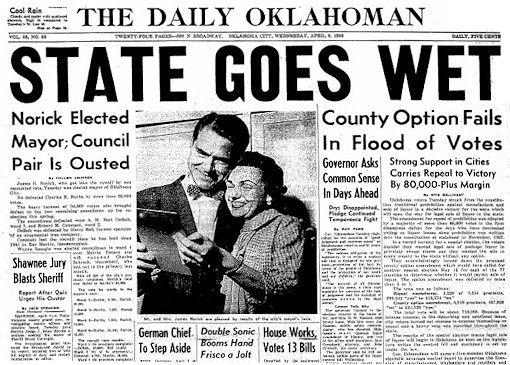
In this article, former Oklahoman reporter Jim Kyle continues sharing his recollections about Oklahoma and Oklahoma City history — see Part 1 for his first installment and click here for his third article about the Korean war.
This time, Jim describes how I came to be able to purchase, legally, the fine W.L. Wellers Kentucky bourbon whiskey that I enjoy today — but, of course, the story that Jim tells here is about much more than that.
In this piece, he recollects his late-1940s/mid-1950s personal experiences both before and during his time with the Oklahoman in this fascinating period of Oklahoma's, and Oklahoma City's, history.
Jump to Jim Kyle's Article
INTRODUCTION. Following the April 22, 1889, Land Run, Oklahoma City, and probably Oklahoma Territory, generally, was wide open as far as liquor issues were concerned. The Oklahoma City Chamber of Commerce's 1903 publication promoting the city to those outside of Oklahoma featured the city's whiskey wholesalers as well as the fine Southern Club.
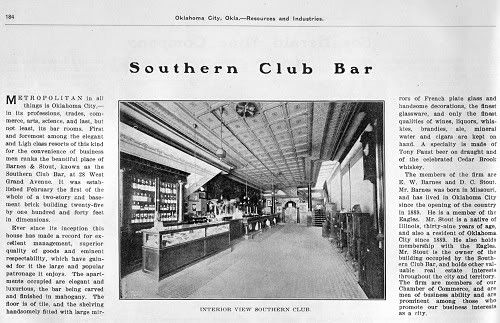
About that establishment, the Chamber said,
METROPOLITAN in all things is Oklahoma City — in its professions, trades, commerce, arts, science, and last, but not least, its bar rooms. First and foremost among the elegant and high class resorts of this kind for the convenience of business men ranks the beautiful place of Barnes & Stout, known as the Southern Club Bar, at 28 West Grand Avenue. It was established February the first of the whole of a two-story and basement brick building twenty-five by one hundred and forty feet in dimensions.
Ever since its inception this house has made a record for excellent management, superior quality of goods and eminent respectability, which have gained for it the large and popular patronage it enjoys. The apartments occupied are elegant and luxurious, the bar being carved and finished in mahogany. The floor is of tile, and the shelving handsomely fitted with large mirrors of French plate glass and handsome decorations, the finest glassware, and only the finest qualities of wines, liquors, whiskies, brandies, ale, mineral water and cigars are kept on hand. *** The firm [that owns the business] are members of our Chamber of Commerce, and are men of business ability and are prominent among those who promote our business interests as a city. At that time, it is more than evident that the whiskey business, wholesale and retail, had the blessing of the Oklahoma City Chamber of Commerce, and probably of the city's elected leaders.
1906-1907 — The Drought Begins. All that would change if Oklahoma and Indian Territories wanted to become a state. Congress's 1906 Enabling Act authorizing the admission of Oklahoma and Indian Territories as a state came with strings and one of them was prohibition. The Encyclopedia of Oklahoma History & Culture says, "Prohibition of the manufacture, sale, barter, or gift of liquor was mandated for twenty-one years, after which time the constitution could be amended for or against." The territories complied, adopted its constitution inclusive of prohibition, and Oklahoma was admitted to the Union on November 16, 1907.
That's pretty much where Jim's article begins with the rest of the story.
JIM KYLE'S ARTICLE. Below, enjoy the personal recollections of Jim Kyle before, during, and after the 1959 "Prairie Fire" campaign of Governor J. Howard Edmondson and his prohibition enforcement czar Joe Cannon.
How Two Men Ended ...
The 52-year Drought
By JIM KYLE
In the mid-1950s, Oklahoma was one of the very few states that still prohibited the sale of alcoholic beverages. It had been that way for its entire existence as a state, and few citizens expected the situation to ever change.
Before statehood, things were different — at least they were in one of the Twin Territories. Oklahoma Territory was home to as many saloons and liquor stores as any other part of the great west. However Indian Territory, the southern area given over to the Five Civilized Tribes, had never allowed the sale of "firewater."
That prohibition had, of course, given rise to an illicit industry of importing it into the area. One of the earliest means of doing so provided a name for the activity. An importer would stuff a few pint bottles into the leg of each of his boots. And "bootlegging" was born.
Not all potables had to be imported. The Choctaws, in particular, honed brewing into a fine art, and "choc beer" was noted throughout both of the territories. It remains popular to this day, especially in "Little Dixie" (the southeastern quarter of the state and home of the Choctaw and Chickasaw Nations).
However, to our north in Kansas the Temperance movement was strong. Carrie Nation brought her hatchet into Oklahoma quite often. Many of our early settlers were quite conservative, as well, and despised the "wild wild west" reputation we were earning. Consequently when our Constitutional Convention met to frame a constitution for the soon-to-be state, it wrote into the document an absolute prohibition on the sale of intoxicating beverages in any form. Not until 1933 did we permit even 3.2 percent beer, and the courts ruled that it was non-intoxicating despite ample evidence to the contrary.
Exceptions existed for certain medicines, of course. Had they been tested, some patent medicines would have registered as 80 proof or higher. Still they were made so foul-tasting that few people used them as anything other than medicine. For a time, liquor itself was available by prescription as a medicine, but that option did not last long.
But Oklahomans didn't stop drinking. The mere fact that its sale was illegal had absolutely no effect on the flow of alcohol into the state. The bootleggers simply expanded their operations to the north. Before long, every town in the state had at least one resident bootlegger, and everyone who cared knew exactly how to get his wares.
My personal knowledge of the situation began about 1948, when I left home to attend OU down at Norman. My parents did not drink, and the only liquor in our home was a bottle of bourbon that my father mixed half and half with honey as a cough syrup. Sometime during my freshman year, I learned how easy it was to buy a half-pint of Black and White Scotch (the beverage favored by one of my favorite fictional characters, Simon Templar AKA The Saint). I didn't really like the taste of the stuff, but it seemed to be a part of growing up so I managed to get it down — not enough to even get a slight buzz, but enough to make me feel truly cosmopolitan.
Because I had skipped a grade early in my school days, I was a year younger than most of my classmates — and because of that, had a worse case of adolescent angst than most of them. By my Junior year, my first puppy love had gone sour, and as the annual Journalism Day party approached I was in a foul and self-pitying mood. My two roommates and I pooled our pennies, drove out west along SH 9 to the resident bootlegging establishment, and bought a whole fifth of Seagram's Seven Crown. It accompanied us to the party; traditionally, the faculty chaperones always looked the other way at the affair, so there was no risk of discipline although none of us was even close to 21 years old.
We all had moderately weak mixes with Seven-Up for our first round, but unlike my earlier experiments with Scotch they were strong enough to give us mild buzzes. I grew a bit maudlin, but my roommates grew mischievous. When I asked for a second, they left out the mixer and poured it straight. I drank it down and asked for another. And another. And ...
I don't remember much about the rest of that evening. I do recall that I finished most of the bottle, and that they took me to an all-night restaurant and poured black coffee into me. I also remember discovering that my bed had the strange capacity to rotate up to the ceiling, but no matter how hard I tried, I couldn't fall out of it. And I know that I was sicker than a whole pound full of dogs for the rest of the night, until there was nothing left in me to get rid of.
By all rights the poisonous effects of that night should have killed me, but instead I developed a physical aversion to alcohol. I was, and still am, unable to force down a drink of any appreciable strength. While I didn't become a teetotaler at that point, I did learn to avoid drinking enough to lose control of myself — and only one other time, the afternoon of July 27, 1953, when the truce in Korea was signed, have I gone over that limit.
I believe that the only unusual thing about my experience was that it had such a lasting effect in steering me away from the bottle. Far too many of my friends from high school days wound up as hopeless alcoholics, partly because it was so easy to come by.
 Here in OKC, bootleggers handed out business cards bearing their phone numbers all over the place. All anyone had to do was call one of those numbers, at any time, day or night, and place an order. Within a very few minutes, a car would pull up to the home, money would change hands, and the delivery was made. Neither the age nor the sobriety (or lack thereof) of the buyer made any difference. And the cost was actually lower than in surrounding states where sales were legal, because no state tax was collected. Here in OKC, bootleggers handed out business cards bearing their phone numbers all over the place. All anyone had to do was call one of those numbers, at any time, day or night, and place an order. Within a very few minutes, a car would pull up to the home, money would change hands, and the delivery was made. Neither the age nor the sobriety (or lack thereof) of the buyer made any difference. And the cost was actually lower than in surrounding states where sales were legal, because no state tax was collected.
By the time I held my first reporting job, at Ardmore, I had become a firm opponent of the system of prohibition in our state — but held little hope of it ever changing. Attempts had been made regularly, and just as regularly they went down in flames. Even before his death in 1935, Will Rogers had quipped that "Oklahoma will stay dry as long as the voters can stagger to the polls," and history had proven him correct.
My main objections to it were that it fostered corruption among law enforcement officers, and allowed no regulation to protect youngsters from making the same kinds of mistakes that I had. The prospect of additional state taxes also entered into it, but nowhere near as strongly.
Again, I had a bit of personal experience with apparent corruption in law enforcement. Almost as soon as I arrived and made myself known to the people on my beat, the sheriff offered me a key to his offices — which also opened the evidence room where seized liquor was kept. The deputies advised me to visit whenever I got thirsty. I only used the key to visit the jail for supper occasionally; they had a chronic prisoner who was an excellent cook and who prepared all the meals!
I remember accompanying a deputy and an OSBI investigator on a "raid" during the time that Perry White (later editor of The Daily Oklahoman) was my intern. They greeted the 'suspect" like old friends, searched, found a single bottle, and confiscated it. The OSBI agent then gave Perry and me a demonstration of his quick-draw expertise, shooting a half-dollar out of the air. I was certain the whole show had been rigged for our benefit, but saw no point whatsoever in saying so.
I also found it totally illogical that candidates would spend tens of thousands of dollars campaigning for offices such as that of county sheriff, which would pay the winner at best a few thousand total over the entire term. I became ever more certain that the real payoff came under the table, but was also certain that any attempt to expose the situation would be futile.
Some newspapers decried the situation, although few went so far as to openly support repeal of the constitutional provisions. While at Ardmore, I went on a 10-day tour of Europe provided by the Air Force, and in Frankfurt-au-Main I purchased a Minifon wire recorder. This was the device that gave rise to the phrase "'wearing a wire" since it was small enough to be concealed at the small of the wearer's back, and its microphone was disguised as a wrist watch. I wanted it primarily as a high-tech toy, but saw possibilities of using it should I ever encounter a situation where I could.
After I came back to OKC and joined OPubCo, police reporter Jack Jones came up with an idea to dramatize how open bootlegging was in our city. We had two obviously under-age copy boys who volunteered for the job, and we put my recorder on one of them. We then gave the boys a hundred dollars or so, and Jack drove them (in an unmarked vehicle) to several open bootlegging locations. Their jobs were to buy a bottle at each, while recording the conversations.
Many apologists for the bootleggers had claimed that they would not sell to minors. Our operation was intended to test those claims.
It was a total success. Every place sold the boys their bottles, and none of them had questioned their ages. As the sting progressed, Jack suggested that the boys make it plain they were under age, but even so the bootleggers didn't care. We transcribed the wires, and went to press.
Of course, nothing happened. The adults involved were arrested, paid minor fines, and went right back into business. There was some talk of charging them with "contributing to the delinquency of a minor" and I had to maintain an evidence chain on the wires for a time, but that all faded away without any actual action.
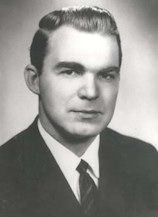 However, the problems with prohibition were becoming ever more obvious, and in 1958 a 33-year-old county attorney from Tulsa named J. Howard Edmondson ran for governor on a platform that promised yet another vote on the subject. He conducted a whirlwind campaign, and won election in a landslide, becoming the youngest governor the state has ever had. However, the problems with prohibition were becoming ever more obvious, and in 1958 a 33-year-old county attorney from Tulsa named J. Howard Edmondson ran for governor on a platform that promised yet another vote on the subject. He conducted a whirlwind campaign, and won election in a landslide, becoming the youngest governor the state has ever had.
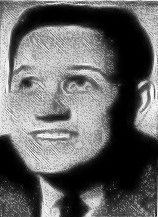 What few had anticipated was that Edmondson would use Will Rogers' quip as the basis of his strategy. He appointed childhood friend, fraternity brother, and Marine combat veteran Joe Cannon, just elected county attorney at Muskogee, as his commissioner of public safety, and immediately after taking office on January 12, 1959, the new governor and his Highway Patrol chieftain began enforcing existing laws to the hilt. What few had anticipated was that Edmondson would use Will Rogers' quip as the basis of his strategy. He appointed childhood friend, fraternity brother, and Marine combat veteran Joe Cannon, just elected county attorney at Muskogee, as his commissioner of public safety, and immediately after taking office on January 12, 1959, the new governor and his Highway Patrol chieftain began enforcing existing laws to the hilt.
Up until then, "private" clubs (that anyone could join for a dollar or two at the door) offered a safe way to enjoy a night out, with drinks. The courts had held that a private club was an extension of one's home, and as such was off limits to officers unless they had valid search warrants. The clubs kept members' "private bottles" and that evaded the prohibition on sales — the club merely offered the service of pouring or mixing the drinks, and nobody questioned how the members obtained those private bottles. Many, of course, had not done so at all; the bartender had simply tagged the bottle with the member's name.
That changed when Edmondson and Cannon began their drive. Virtually every private club in the state, with two notable exceptions, was raided — with valid search warrants, requested at the last minute by Cannon and with the issuing judge being taken along on the raid so that he could not possibly warn anyone.
The two exceptions were The Oklahoma City Press Club, and The Branding Iron. The press club was excluded for obvious reasons: bad publicity would be disastrous. The Branding Iron was the governor's own favorite hangout. However many others that had been considered immune were hit, including The Beacon Club atop the First National Building, and the Petroleum Club. And at each raided club, if the raiders found a single bottle of liquor, all the customers were herded off to jail and charged with frequenting a disorderly house.
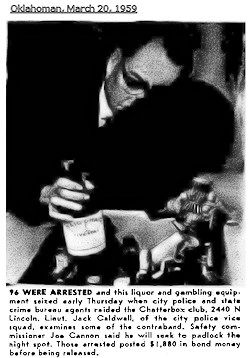 I witnessed one such raid, at the Chatterbox Club operated by Dick Dolph near the Capitol. The establishment, less than a block from the statehouse at 2440 N Lincoln Boulevard, was a favorite of state officials, and on the night of March 19 was filled with legislators and lobbyists. I got a strange message from the police dispatcher about 7 p.m. that evening, to meet a detective cruiser at the south side of the Capitol building. When I got there, the entire group was reviewing plans for the raid. I called for a photographer to meet me, and at about 9 p.m. we followed the raiding party to the night club. I witnessed one such raid, at the Chatterbox Club operated by Dick Dolph near the Capitol. The establishment, less than a block from the statehouse at 2440 N Lincoln Boulevard, was a favorite of state officials, and on the night of March 19 was filled with legislators and lobbyists. I got a strange message from the police dispatcher about 7 p.m. that evening, to meet a detective cruiser at the south side of the Capitol building. When I got there, the entire group was reviewing plans for the raid. I called for a photographer to meet me, and at about 9 p.m. we followed the raiding party to the night club.
It took every paddy wagon that OCPD could muster to haul 96 customers and employees down to jail. They all gave fictitious names (including Billie Holiday and Louis Armstrong), and that was the thrust of my story in the next morning's paper. One of the customers was the representative of a plastics company, who had arrived in Oklahoma City that afternoon to evaluate it as the possible site of a new plant. He left for Dallas the next morning after writing OKC off of his list.
Cannon and Edmondson also went to extreme lengths to halt importation of liquor into the state. They set up roadblocks on all the main highways, stopping and searching all vehicles, including semi-trailers and cross-country buses. Of course it was a horrible inconvenience to travelers, and may well have been illegal interference with interstate commerce, but the searches continued right up until old laws were replaced, even after the special election called to decide the issue.
Again I had personal experience. My wife, baby son (only about a month old), and I drove down to Whiskeyta Falls, Texas, to replenish the personal stocks of my family and immediate relatives. Knowing we would be stopped on the way home, we packed the 4 or 5 bottles in the baby's crib, beneath his blankets — and added additional blankets for padding. As we had hoped, he dozed off as soon as we began the trip back, and was totally out of it, snoozing peacefully atop the booze, when the Highway Patrol trooper pulled us over and looked into the car.
The trooper saw nothing amiss, commented on how comfortable the baby looked, and waved us on through. Mission accomplished!
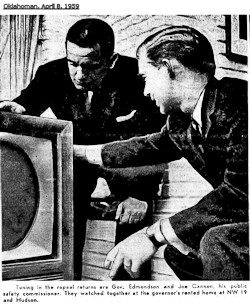 Edmondson and Cannon continued the crackdown until the day of (and even a bit after) the special election to repeal prohibition. They made it very difficult for Oklahomans to stagger to the polls, and also illustrated exactly what the outdated laws were like when fully enforced. The result, of course, was inevitable. On April 7, 1959, Oklahoma's prohibition era came to an end by an overwhelming vote. Edmondson and Cannon continued the crackdown until the day of (and even a bit after) the special election to repeal prohibition. They made it very difficult for Oklahomans to stagger to the polls, and also illustrated exactly what the outdated laws were like when fully enforced. The result, of course, was inevitable. On April 7, 1959, Oklahoma's prohibition era came to an end by an overwhelming vote.
At first it wasn't all rosy, though. The initial restrictions on liquor stores were rather extreme. Their advertising was limited to a single sign with letters no more than a few inches high, and the allowable shape and wording of the sign was written into the law. Sale of liquor by the drink was still outlawed. Minors were (and still are) not allowed on the premises for any reason; on our first visit to a legal liquor outlet in OKC, we had to leave our sons in the car although none were yet of school age. Fortunately their grandmother was there to keep them company.
Many of the restrictions have been eased over the years, and it's now legal to order a drink over the bar — but only in some counties. Others still prohibit sale by the drink.
Once the matter was settled, Cannon resigned the post of public safety commissioner to join Edmondson's staff as its legal assistant. A year later, he left that position to establish a private law practice in Oklahoma City but remained a close associate of the governor and still served part-time on his staff. He later became a district judge in Oklahoma County, retired in 1988, and passed away on February 23, 2003.
Edmondson served two terms as governor, resigning shortly before the end of the second to be appointed to the U.S. Senate, filling the vacancy created by the death of Robert S. Kerr. During those two terms he made other significant changes to the state's governmental structure, including creation of the merit system for state employees — but the demise of prohibition remained his major accomplishment in the eyes of many Oklahomans.
Sadly, he survived that milestone by little more than a dozen years, dying on November 17, 1971 at the age of 46.
Edmondson and Cannon are both gone now, but they certainly earned their places in the ranks of Oklahoma officials who made significant changes to the state. |
Go To Top
... Click here to read the full article and any comments ...
|



 Here in OKC, bootleggers handed out business cards bearing their phone numbers all over the place. All anyone had to do was call one of those numbers, at any time, day or night, and place an order. Within a very few minutes, a car would pull up to the home, money would change hands, and the delivery was made. Neither the age nor the sobriety (or lack thereof) of the buyer made any difference. And the cost was actually lower than in surrounding states where sales were legal, because no state tax was collected.
Here in OKC, bootleggers handed out business cards bearing their phone numbers all over the place. All anyone had to do was call one of those numbers, at any time, day or night, and place an order. Within a very few minutes, a car would pull up to the home, money would change hands, and the delivery was made. Neither the age nor the sobriety (or lack thereof) of the buyer made any difference. And the cost was actually lower than in surrounding states where sales were legal, because no state tax was collected.

 What few had anticipated was that Edmondson would use Will Rogers' quip as the basis of his strategy. He appointed childhood friend, fraternity brother, and Marine combat veteran Joe Cannon, just elected county attorney at Muskogee, as his commissioner of public safety, and immediately after taking office on January 12, 1959, the new governor and his Highway Patrol chieftain began enforcing existing laws to the hilt.
What few had anticipated was that Edmondson would use Will Rogers' quip as the basis of his strategy. He appointed childhood friend, fraternity brother, and Marine combat veteran Joe Cannon, just elected county attorney at Muskogee, as his commissioner of public safety, and immediately after taking office on January 12, 1959, the new governor and his Highway Patrol chieftain began enforcing existing laws to the hilt.














